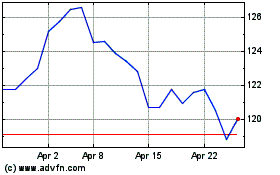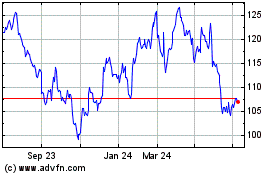By William Boston
WOLFSBURG, Germany -- The day after summer vacations ended and
employees returned to work, Volkswagen AG's in-house medical unit
was faced with a reality it had been fearing for weeks.
An employee at the company's seat-building unit who had returned
from vacation in Croatia tested positive for Covid-19.
With the resumption of tourism and summer festivities in Europe
fueling a new rise in infections, companies that have been
virus-proofing their premises for the winter are facing a fresh
challenge: preventing employees returning from the continent's
sacrosanct two- or three-week summer break from bringing the virus
back to work with them.
"Every day now the European region reports an average of over
26,000 new Covid-19 cases," Hans Kluge, the World Health
Organization's regional director for Europe, said last week.
"People have been dropping their guard."
Germany has said that 40% of new cases in the country were
contracted abroad, adding that regions of the country where school
holidays have been over for several weeks have been seeing a
slowdown in the pace of new infections.
A study of 55,000 patients released last week by the Robert Koch
Institute, the country's leading epidemiological body, showed 5,800
infections occurred in the workplace, the third most represented
location after nursing homes and households. The findings highlight
businesses' vulnerability to infections as governments remain
desperate to avoid a second lockdown.
In a separate study, the European Centre for Disease Prevention
and Control said 1,844 people across the region had been infected
in factories, offices, on construction sites, in stores and in
mines by the beginning of July.
Some governments have taken action. After a sharp rise in
infections linked to the relaxation of lockdown and distancing
measures in daily life and during vacations, France made face masks
mandatory in the workplace this month. Politicians in Germany have
called for similar steps. Some European countries have resumed
restricting international travel or requiring that visitors
quarantine upon arrival.
When news of the infection broke at the Volkswagen unit, the
medical team jumped into action. The employee, who wasn't
identified for privacy reasons, was immediately isolated from
co-workers, who were also tested by the company's in-house medical
team. By the end of the year, VW aims to have 10 such testing labs
at its factories in Germany.
Local health officials were called in and began tracing the
patient's contacts. Employees who had interacted with the infected
co-worker were sent home for a two-week quarantine.
So far, the infection appears to be contained. But this week,
two employees at VW's main campus in Wolfsburg tested positive
after returning from their summer vacations, and the response team
was rolled out again.
"Before the summer vacations began we asked ourselves: What
happens when people return from their holidays?," Gunnar Kilian,
VW's board member in charge of human resources, told reporters on
Tuesday. "We also want to be prepared for the fall, when infections
will rise, and do our part to make sure there isn't another
lockdown."
ASML Holding NV, a Veldhoven, Netherlands-based
semiconductor-equipment maker, is putting into practice lessons
learned from earlier this year when some of its Dutch employees
were required to quarantine at home upon returning from ski
vacations in Austria.
"We notified our employees before the start of the [summer]
vacation period that ASML cannot and will not tell employees where
they can or cannot go on vacation, but we do impose rules regarding
the access to ASML sites when employees return," said Monique Mols,
the company's spokeswoman.
Returnees "have been identified as a risk," Mathias Braje, head
of business software group SAP SE's global Covid-19 task force,
told The Wall Street Journal. "We ask people to please work from
home for at least 14 days upon their return."
At the end of June, SAP employed 43,184 people in its European
operations, and had a global workforce of 101,379 employees.
Unlike VW, the German software company isn't providing on-site
testing, though Mr. Braje didn't rule out doing so in the future.
For now, he feels that government testing at international border
crossings such as airports -- now mandatory in Germany for anyone
returning from a high-risk destination -- is sufficient.
So far, he says he isn't aware of any SAP employees testing
positive after their vacation. The company posted messages on its
intranet to inform employees of the risks before the vacation
season started.
"We really try to educate our employees so that they understand
what are the risky spots," he said. "On a country level, specific
information has been sent. But we don't interfere with their
private travel plans."
About 85% of SAP's global workforce is still working from home.
Its 40 U.S. sites remain closed and only a few will open by late
September as a test. In Germany, its home base, SAP employs about
23,000 people and 10% of them have returned to the office.
A survey of European workers published by Morgan Stanley in
August showed that around 53% of European workers overall have
returned to the workplace full time, but just 42% of office workers
have.
"The majority of our people in the U.S. will work from home
until the end of the year," Mr. Braje said.
Sebastian Fritz, the European chief of Somerville, Mass.-based
FormLabs Inc., a 3-D printer manufacturer, sent an email to
employees on Aug. 19, warning about the risks posed by returning
vacationers.
"As vacations are coming to an end, we need to implement some
risk measures to protect everyone in our office," Mr. Fritz wrote
in the email, which was viewed by the Journal.
FormLabs employees in Europe who visit a country considered a
Covid-19 hot spot need to provide the company's human-resources
department with a negative coronavirus test result and quarantine
for 10 days before returning to work.
"Fortunately, we've not yet had anyone test positive upon their
return," Mr. Fritz told the Journal.
Write to William Boston at william.boston@wsj.com
(END) Dow Jones Newswires
August 27, 2020 09:56 ET (13:56 GMT)
Copyright (c) 2020 Dow Jones & Company, Inc.
Volkswagen (TG:VOW3)
Historical Stock Chart
From Mar 2024 to Apr 2024

Volkswagen (TG:VOW3)
Historical Stock Chart
From Apr 2023 to Apr 2024
